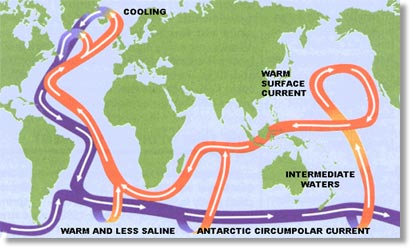Global warming - will we freeze? |
|
|
|
|
|
||
|
How the Gulf Stream works Britain is much warmer than other countries on the same latitude, and this is partly due to the Gulf Stream - a current of warm water that flows from the Gulf of Mexico past the shores of western Britain. It is part of a larger system of ocean currents (with a hundred times the flow of the Amazon) often called the 'conveyor belt'. The engine that drives this conveyor is in the Arctic; surface sea water there is cooled by bitter winds, becomes denser, sinks to the bottom of the ocean and flows south - the return current of warm surface water is the Gulf Stream. But this sinking process can be disrupted when fresh water overlays the salty ocean water - fresh water from rain, rivers or melting ice; an increase in fresh water could slow down or even switch off the Gulf Stream. If it did, a 'what-if' experiment with the Hadley Centre computer model shows that the UK would cool by up to 5 °C, and it could happen quickly - in a matter of a decade or two. If it did happen, the disruption to society would be enormous. But will it happen?
What could happen? The Gulf Stream has switched off before, at the end of the last ice age about 13,000 years ago, when meltwater from a huge glacier in Canada flowed into the North Atlantic and stopped the sinking mechanism - Europe cooled by several degrees in only one or two decades. Richard Wood and his team at the Hadley Centre used their complex climate model to look at the effect on the Gulf Stream of future climate change, caused by the greenhouse effect as carbon dioxide is emitted in ever-increasing quantities. What they found was that, yes, the Gulf Stream did slow down - by about 20% by the middle of the century - but it didn't completely switch off. And the cooling effect on Britain of the decreased flow was more than offset by the greenhouse-effect warming. How sure are we? But don't relax completely yet; this might be the prediction from the Hadley Centre's model (and from other climate models), but there is an enormous amount we don't understand about the earth's climate system, and the oceans in particular, so we need to make sure this reassuring prediction is a robust one. And some recent measurements from research ships in the Arctic seem to indicate that changes are already taking place which could call the model predictions into question. So research continues apace to gain a better understanding of processes in the oceans that could affect the conveyor belt.
More about the Hadley Centre for Climate Prediction and Research |
 Global
ocean circulation
Global
ocean circulation